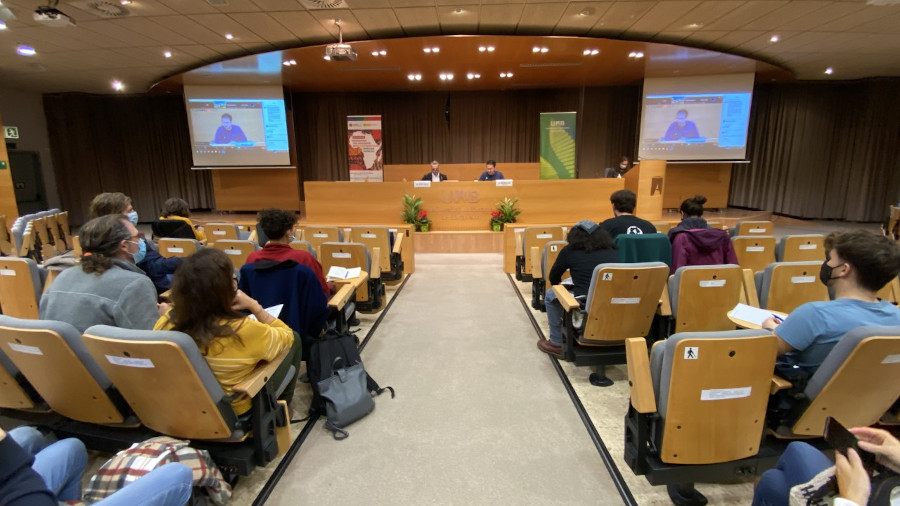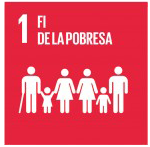Debate on food insecurity and climate change in Africa
The third session of the debate cycle “Reshaping the dialogue with contemporary African worlds” organised by the Alliance 4 Universities brought together experts in biology, economics, agriculture and anthropology to debate on the effects of climate change on food production security in Africa.

The conference hall of the Rectorat building held a mixed session today, 25 November, to speak on “Ensuring Securing Food Production in a Climate Change Environment”, coordinated by the Institute for Environmental Science and Technology (ICTA-UAB) through its research group LICCI and under the framework of the debate cycle on en el marc del cicle de debats “Reshaping the dialogue with contemporary African worlds”, organised by the Alliance 4 Universities (A4U).
The session reflected on food insecurity, one of the world’s most serious but least addressed socioeconomic and health problems, hitting hardest the poorest and most vulnerable. The current climate crisis contributes to exacerbate food insecurity by affecting food production, and Africa is one of the most vulnerable regions in the world to the impacts of climate change. The session will hear the voices from experts from different disciplines (crop science, fisheries, pastoralism, local knowledge) on the topic. Participants will reflect on the complexity of the climate change impacts on African food production systems and on possible pathways to transition towards more sustainable food systems, able of sustain healthy, nutritious and culturally appropriate diets in the light of climate change.
UAB Vice Rector for International Relations Màrius Martínez gave the opening speech at the conference. In his speech, he qualified the effects of climate change on food security as “one of the most challenging and threatening issues, not only for Africa’s communities but also for the rest of the world”. Journalist Agus Morales, former student at the UAB and director of the magazine 5W and contributor to The New York Times, moderated the session, which included the participation as keynote speaker of Ndjido A Kane, Director of the Institut Sénégalais de Recherches Agricoles (ISRA)-CERAAS.
Plant geneticist and molecular biologist Dr Kane presented the main lines of research conducted at his centre, and highlighted the fact that “climate changed is hitting Africa hard and we this challenge must be overcome with scientific research”. The analysis and monitoring of resources are the focus of some of these lines of reasearch, taking into account that “there are 249 million women shepherds in Africa and their herds are their main source of income, so the impact of climate change to their environment must be analysed”. He went on to say that: “To reach economic benefits and be sustainable it is critical to monitor and evaluate our biological resources”.
Also participating were Vanesse Labeyrie, researcher at the French research institute CIRAD in Montpellier, who spoke on the role of connections and relations when it comes to the resilience of small farms in Africa; Narriman Saleh-Jiddaw, expert in marine sciences at the University of Dar es Salaam (Tanzania – Zanzibar), who spoke on the availability of marine food resources on the island of Zanzibar; Lucas Yamat, climate change economist from the Basque Centre for Climate Change (BC3), on the perspectives of apstoralism in eastern Africa; and ICTA-UAB anthropologist Victoria Reyes-García, who spoke on the importance of the local knowledge of indigenous people to best manage the impacts of climate change.
Javier Lafuente, Rector of the UAB, gave the closing speech and highlighted that the UAB, as part of the A4U “is really interested and committed with this dialogue with our African partners and colleagues, and with the collaboration that must be done between researchers from African universities and organizations and our universities and research centres”. “ There’s much to do but we’re showing our willingness to increase our shared activities with African researchers and universities and I am sure that this event has contributed to doing so”, concluded Rector Lafuente.
The debate cycle is part of the Alliance 4 Universities’ internationalisation project as well as its commitment to build stronger ties with universities in Africa. The cycle, which is made up of four different conferences organised by the member universities of A4U, brings together African and European researchers and academics to debate on four key pillars of Africa’s present and future: feminism, migrations, climate change, and African culture.
The session was recorded and is available on the A-4U YouTube channel. This event received support from the Spanish Institute of Foreign Trade (ICEX).
The UAB, with Sustainable Development Goals
 No poverty
No povertyZero hunger
Partnerships for the goals
Clean water and sanitation
Climate action